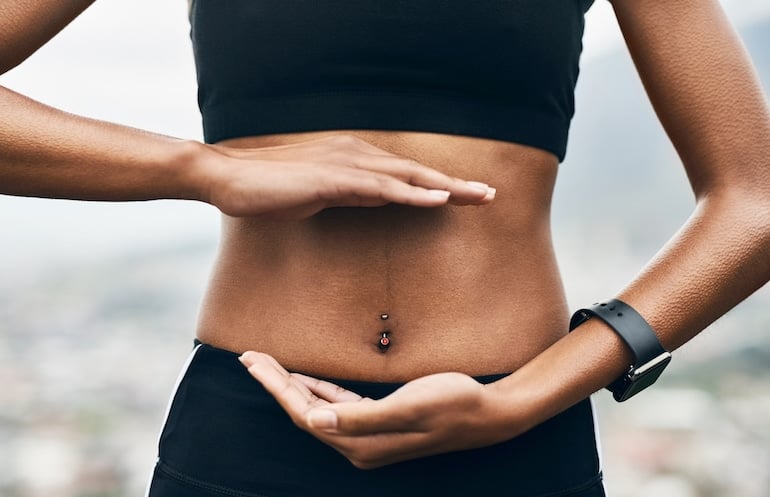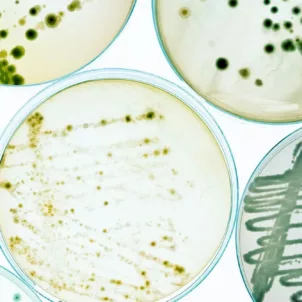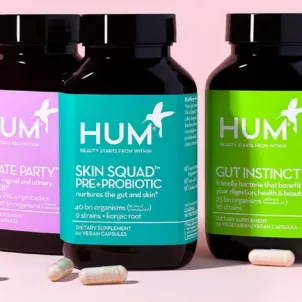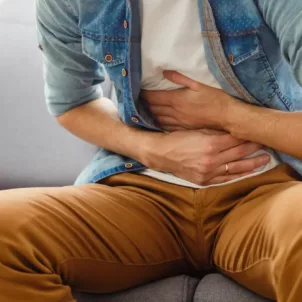By now you’re likely familiar with prebiotics and probiotics. You may have even heard of synbiotics, a combo of the two. But the newest players in the gut health game are postbiotics. So new, in fact, that The International Scientific Association of Probiotics and Prebiotics (ISAPP) just came to an agreement on their definition in May 2021. So what are postbiotics? Before we dive into the science of these gut-friendly compounds, a quick refresher.
Probiotics are live bacteria that help colonize good bacteria in your gut. Prebiotics actually feed these good bacteria, so both are necessary. A supplement combining prebiotics and probiotics is referred to as a synbiotic. Having a diverse gut microbiome and a healthy balance of good gut bacteria is linked to health benefits ranging from clear skin to improved mood and a lower risk for many diseases.
Below, we’ll cover how postbiotics fit into the puzzle and what you need to know about the buzzy term.
What Are Postbiotics?
According to an article in the International Journal of Molecular Sciences, postbiotics are “bioactive compounds produced by food-grade microorganisms during a fermentation process.” The ISAPP has stated their official definition is a “preparation of inanimate microorganisms and/or their components that confers a health benefit on the host”. Exactly what does all that mean in layman’s terms? “Postbiotics is an umbrella term for the variety of metabolites and by-products that form from the action of probiotic bacteria in the gut,” explains Jennifer Martin-Biggers, PhD, MS, RDN, the VP of scientific affairs and education at HUM Nutrition. “Before they die, probiotic bacteria also shed parts of their cells, which can have benefits and are considered to also be postbiotics,” she says. Essentially, while probiotics are living organisms, postbiotics are non-living organisms that still have health benefits.
While the term postbiotics is new, our bodies have always been producing these compounds on their own. “There are a myriad of different things that probiotic bacteria produce in our guts as by-products of their fermentation action,” explains Dr. Martin-Biggers. “It can be helpful to classify these under a definition that signals where they came from.”
Benefits of Postbiotics

While there are many types of postbiotics, research is still emerging on the benefits of some, whereas others have been more closely studied. “Postbiotics have benefits similar to supplementing with probiotics or prebiotics, as they are a by-product of probiotics fermenting prebiotics,” says Dr. Martin-Biggers. “The benefits include support of the immune system, gut and digestive benefits, mood and brain benefits, and more.”
Short-chain fatty acids
Short-chain fatty acids (SCFAs) include things like acetate, butyrate, and propionate. They are produced from the fermentation of carbohydrates. Butyrate is one of the more studied SCFAs and research has found it provides an energy source for colon epithelial cells and helps to fortify the intestinal barrier, making it crucial for gut health. While more research is needed, some practitioners are anecdotally finding butyrate helps people suffering from leaky gut.
Other research in mice has found butyrate may enhance sleep, making it a promising SCFA. Researchers are still discovering more about the role of SCFAs, but suspect they play a role in gut-brain interactions.
Neurotransmitters
Neurotransmitters, the body’s chemical messengers, allow neurons to communicate with each other and muscles. GABA is one important inhibitory neurotransmitter that can modulate mood, relaxation, sleep, and temporal and spatial memory, explains Dr. Martin-Biggers. It is produced through the fermentation of L-glutamic acid. “Lactobacillus, Bifidobacterium, and Bacteroides strains of probiotics are particularly good at fermenting L-glutamic acid,” says Dr. Martin-Biggers. “Production of GABA and potentially other metabolites can influence the gut-brain axis and provide mood and stress benefits.”
Vitamins + Nutrients
“Humans are incapable of naturally synthesizing most vitamins and need to ingest them via their diet or through supplements,” explains Dr. Martin-Biggers. “There are some vitamins, however, that are produced in varying quantities in the body as a by-product of intestinal bacterial fermentation.” Folate, biotin, riboflavin, vitamin K, and amino acids are all well-studied examples produced in this way.
Folate, or vitamin B9, helps your body make DNA and new cells. It’s also crucial during pregnancy for healthy development. Biotin and riboflavin are also B vitamins and are involved in metabolizing macronutrients. Biotin is also beneficial for strong hair and nails, which is why you can find it in HUM’s Killer Nails and Hair Sweet Hair.
Vitamin K plays a role in blood clotting and helps to move calcium into your bones. Finally, amino acids combine to form proteins and are considered the building blocks of life.
Other compounds
There are also lesser-known compounds that appear to have a benefit to the host organism (that’s you!). Peptidoglycan, a postbiotic from Lactobacillus probiotic strains, for instance, improved innate and adaptive immune responses in mice and suppressed a pro-inflammatory cytokine that’s been associated with autoimmune and inflammatory bowel diseases in two separate studies. Another common probiotic species, Bifidobacterium, synthesize exopolysaccharides, which may have heart health benefits.
Should you take a postbiotic supplement?
Before you start Googling postbiotic supplements, it’s important to keep in mind that this categorization is still very new, even if the postbiotics themselves aren’t, so you may not find them widely available on the market. “There are many postbiotics, they just have not necessarily been marketed as such for specific health benefits,” Dr. Martin-Biggers says. For example, you can find butyrate supplements. The good news is that you don’t necessarily need a postbiotic supplement, because by taking both a probiotic and prebiotic, like HUM’s Skin Squad Pre + Probiotic, your body will produce postbiotics on its own.
What about postbiotic foods?

You can’t directly eat a “postbiotic food” explains Dr. Martin-Biggers, but similarly to taking a probiotic and prebiotic, by eating fermented foods rich in probiotics and foods with prebiotic fibers, your body naturally produces postbiotics. “You can create more postbiotic formation in your gut, providing benefits,” she says. By adding these foods into your diet you’ll be getting what your gut needs:
Fermented foods
- Sauerkraut
- Kimchi
- Miso
- Kombucha
- Tempeh
- Kefir
- Pickles
Prebiotic-rich foods
- Artichokes
- Onion
- Garlic
- Asparagus
- Bananas
- Apples
- Dandelion Greens
The Takeaway
Until we have more research on postbiotics and can further develop the targeted, evidence-based supplements, ensuring you are both taking a prebiotic and probiotic and getting prebiotic and probiotic foods into your diet is the best way to reap the benefits of postbiotics. “There is still a lot of research going on to evaluate specific benefits of directly providing postbiotics in supplements,” says Dr. Martin-Biggers. “The pro-and prebiotic world has had massive research and innovation, postbiotics are next!”








